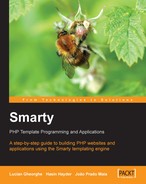Book Description
Key Features
- Bring the benefits of Smarty to your PHP programming
- Give your designers the power to modify content and layout without PHP programming
- Produce code that is easier to debug, maintain, and modify
- Useful for both Smarty developers and users
Book Description
Smarty is a templating engine for PHP. Designers who are used to working with HTML files can work with Smarty templates, which are HTML files with simple tags while programmers work with the underlying PHP code. The Smarty engine brings the code and templates together. The result of all this is that designers can concentrate on designing, programmers can concentrate on programming, and they don't need to get in each others way so much. Even if you are developing a site on your own, Smarty is a powerful way to make your code clearer to you and others, as well as easier to debug and modify later.
What you will learn
- Install and configure Smarty on your Web server
- Understand how Smarty affects your web site architecture, and build site foundations that make the most of what Smarty offers
- Designers will learn to work with templates that contain variables and logic, to modify layouts or content of Smarty web sites
- See how Smarty caching can improve the performance of your sites
- Develop custom Smarty functions and plug-ins to incorporate into your templates
Who this book is for
This book is written for PHP developers who want to use Smarty templates in their development, and for designers who are working with PHP developers who are using Smarty.
Downloading the example code for this book. You can download the example code files for all Packt books you have purchased from your account at http://www.PacktPub.com. If you purchased this book elsewhere, you can visit http://www.PacktPub.com/support and register to have the code file.
Table of Contents
- Smarty PHP Template Programming and Applications
- Table of Contents
- Smarty PHP Template Programming and Applications
- Credits
- About the Authors
- About the Reviewer
- Preface
- 1. Introduction to Smarty
- 2. Smarty Site Architecture
- 3. What Designers Need to Know
- 4. Creating a Template
- 5. Advanced Templating
- 6. Smarty Functions
- Types of Smarty Functions
- Functions in Action
- Action: Re-using Page Elements with the include Function
- Explanation
- Inserting Dynamic Content
- Passing Variables to Included Templates
- Saving Variables in Configuration Files
- Creating Configuration Sections for Each Page
- Handling Lists in Templates
- Removing Extra White Space from Templates
- Handling JavaScript Code in Templates
- Processing Deeply Nested Arrays
- Cycling Through a List of Values
- Avoiding Spam Indexers
- Form-Related Functions
- More Form-Related Functions
- Summary
- 7. Debugging for Designers
- 8. Built-in Smarty Variables and Methods
- Built-in Smarty Variables
- $template_dir
- $compile_dir
- $config_dir
- $plugins_dir
- $debugging
- $error_reporting
- $debug_tpl
- $debugging_ctrl
- $compile_check
- $force_compile
- $caching
- $cache_dir
- $cache_lifetime
- $cache_modified_check
- $php_handling
- $security
- $secure_dir
- $security_settings
- $trusted_dir
- $left_delimiter
- $right_delimiter
- $request_vars_order
- $request_use_auto_globals
- $compile_id
- $use_sub_dirs
- $default_modifiers
- $default_resource_type
- $cache_handler_func
- $autoload_filters
- $config_overwrite
- $config_booleanize
- $config_read_hidden
- $config_fix_newlines
- $default_template_handler_func
- $compiler_file
- $compiler_class
- $config_class
- Handy Built-in Smarty Variables Table
- Built-in Smarty Methods
- assign
- assign_by_ref
- Example: Working of assign and assign_by_ref
- append
- append_by_ref
- clear_assign
- register_function
- unregister_function
- register_object
- unregister_object
- register_block
- unregister_block
- register_compiler_function
- unregister_compiler_function
- register_modifier
- unregister_modifier
- register_resource
- unregister_resource
- register_prefilter
- unregister_prefilter
- register_postfilter
- unregister_postfilter
- register_outputfilter
- unregister_outputfilter
- load_filter
- clear_cache
- clear_all_cache
- is_cached
- clear_all_assign
- clear_compiled_tpl
- template_exists
- get_template_vars
- get_config_vars
- trigger_error
- display
- fetch
- config_load
- get_registered_object
- clear_config
- Summary
- Built-in Smarty Variables
- 9. Caching and Performance
- Caching in Smarty
- Dynamically Caching Template Sections
- Clearing the Cache
- Advanced Caching Features
- Using Cache Groups
- Clearing a Cache Group
- Avoiding the Cache
- Creating a Custom Cache Handler
- Optimizing Smarty Applications
- Profiling PHP
- Designing Sites for Effective Caching
- Tools: ApacheBench (ab)
- Tools: Xdebug
- Tools: WinCacheGrind
- Summary
- 10. Extending Smarty with Plug-ins
- 11. Filters
- 12. Internationalization
- Index
